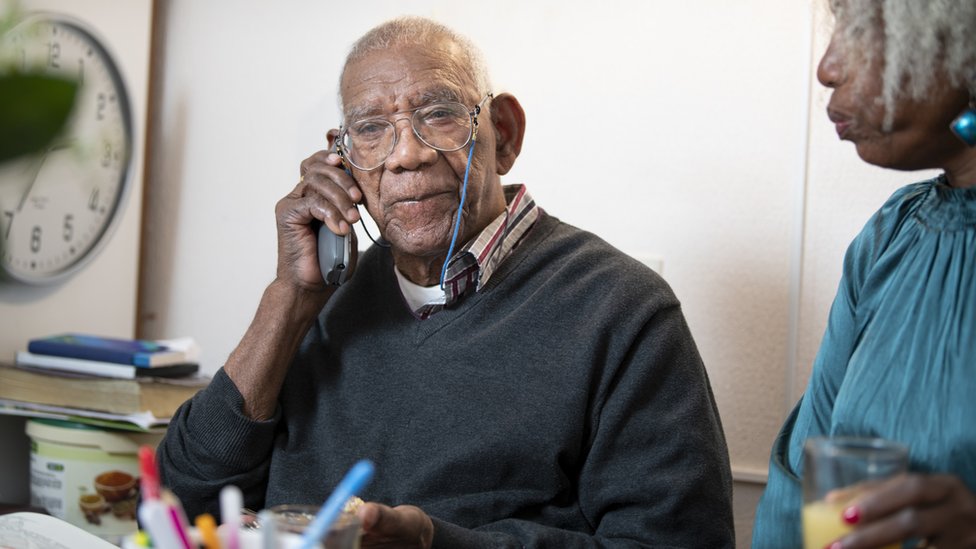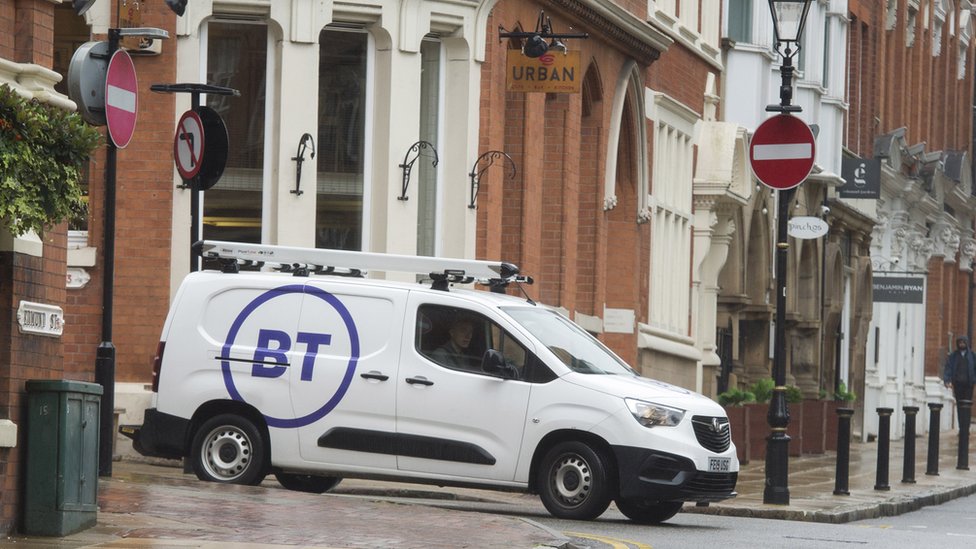BT faces £600m lawsuit over ‘historic overcharging’ – BBC News

Getty Images
BT is facing a class action lawsuit over claims it failed to compensate elderly customers who were overcharged for landlines for eight years.
In 2017, telecoms watchdog Ofcom found that BT had been overcharging 2.3 million landline customers since 2009.
As a result of the review, the firm reduced the price of its landlines by £7 a month.
However, campaigners are unhappy that “loyal customers” have still not been compensated for previous overcharging.
“Ofcom made it very clear that BT had spent years overcharging landline customers, but did not order it to repay the money it made from this,” said Justin Le Patourel, founder of consumer group Collective Action on Landlines (CALL) and a telecoms consultant who worked for Ofcom for 13 years.
“We think millions of BT’s most loyal landline customers could be entitled to compensation of up to £500 each, and the filing of this claim starts that process.”
BT said it “strongly disagrees” with the claim that it had engaged in anti-competitive behaviour and intends to defend itself “vigorously” in court.
A spokesman for BT said: “We take our responsibilities to older and more vulnerable customers very seriously and will defend ourselves against any claim that suggests otherwise.
“For many years we’ve offered discounted landline and broadband packages in what is a competitive market with competing options available, and we take pride in our work with elderly and vulnerable groups, as well as our work on the Customer Fairness agenda.”
Historic overcharging claims
Law firm Mishcon de Reya has filed a claim with the Competition Appeal Tribunal (CAT) worth £600m. The claim could result in payments of £500 each for 2.3 million BT customers, should it be successful.

The case represents customers who purchased a BT landline contract, but did not also take BT broadband or pay TV packages.
Since 2009, the wholesale costs of providing landlines to consumers have been falling by at least 25%. But in October 2017, Ofcom found that all major landline providers in the UK had increased the line rental charges by 28-41%.
Ofcom strongly criticised market leader BT for raising prices, saying that customers were being given “poor value” for money.
It added that many of the affected customers had “been with BT for decades” and were more likely to be old, on low incomes and vulnerable.
As a result of Ofcom’s review, BT announced that it would slash its landline prices by £84 a year.
BT’s argument is that Ofcom’s final statement did not explicitly accuse it of engaging in anti-competitive behaviour.
But independent telecoms analyst Ian Grant says that the telecoms giant “has a history of abusing its position”.
“Earlier in 2017, Ofcom fined BT £42m because it was late providing high-speed Ethernet lines, and forced BT to make good the losses of firms like Vodafone and TalkTalk,” he told the BBC.
“Ofcom, which has a statutory duty to stop consumer abuses, could have done the same for these customers. Instead, it allowed BT to get away with a 37% price cut, at a time when the difference between its costs and what it charged customers had risen between 50-74%.”
Mr Grant added: “It is especially poor that BT was overcharging customers who were mostly over 65, more than three-quarters of whom had never used a different provider, and for whom the telephone was their only communications link.”
Read More: BT faces £600m lawsuit over ‘historic overcharging’ – BBC News

Getty Images
BT is facing a class action lawsuit over claims it failed to compensate elderly customers who were overcharged for landlines for eight years.
In 2017, telecoms watchdog Ofcom found that BT had been overcharging 2.3 million landline customers since 2009.
As a result of the review, the firm reduced the price of its landlines by £7 a month.
However, campaigners are unhappy that “loyal customers” have still not been compensated for previous overcharging.
“Ofcom made it very clear that BT had spent years overcharging landline customers, but did not order it to repay the money it made from this,” said Justin Le Patourel, founder of consumer group Collective Action on Landlines (CALL) and a telecoms consultant who worked for Ofcom for 13 years.
“We think millions of BT’s most loyal landline customers could be entitled to compensation of up to £500 each, and the filing of this claim starts that process.”
BT said it “strongly disagrees” with the claim that it had engaged in anti-competitive behaviour and intends to defend itself “vigorously” in court.
A spokesman for BT said: “We take our responsibilities to older and more vulnerable customers very seriously and will defend ourselves against any claim that suggests otherwise.
“For many years we’ve offered discounted landline and broadband packages in what is a competitive market with competing options available, and we take pride in our work with elderly and vulnerable groups, as well as our work on the Customer Fairness agenda.”
Historic overcharging claims
Law firm Mishcon de Reya has filed a claim with the Competition Appeal Tribunal (CAT) worth £600m. The claim could result in payments of £500 each for 2.3 million BT customers, should it be successful.

The case represents customers who purchased a BT landline contract, but did not also take BT broadband or pay TV packages.
Since 2009, the wholesale costs of providing landlines to consumers have been falling by at least 25%. But in October 2017, Ofcom found that all major landline providers in the UK had increased the line rental charges by 28-41%.
Ofcom strongly criticised market leader BT for raising prices, saying that customers were being given “poor value” for money.
It added that many of the affected customers had “been with BT for decades” and were more likely to be old, on low incomes and vulnerable.
As a result of Ofcom’s review, BT announced that it would slash its landline prices by £84 a year.
BT’s argument is that Ofcom’s final statement did not explicitly accuse it of engaging in anti-competitive behaviour.
But independent telecoms analyst Ian Grant says that the telecoms giant “has a history of abusing its position”.
“Earlier in 2017, Ofcom fined BT £42m because it was late providing high-speed Ethernet lines, and forced BT to make good the losses of firms like Vodafone and TalkTalk,” he told the BBC.
“Ofcom, which has a statutory duty to stop consumer abuses, could have done the same for these customers. Instead, it allowed BT to get away with a 37% price cut, at a time when the difference between its costs and what it charged customers had risen between 50-74%.”
Mr Grant added: “It is especially poor that BT was overcharging customers who were mostly over 65, more than three-quarters of whom had never used a different provider, and for whom the telephone was their only communications link.”
Read More: BT faces £600m lawsuit over ‘historic overcharging’ – BBC News
